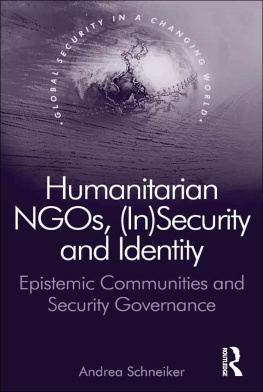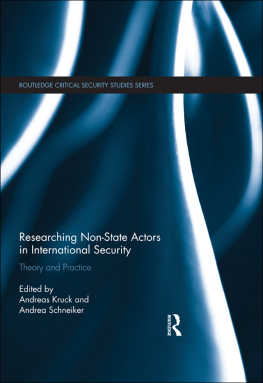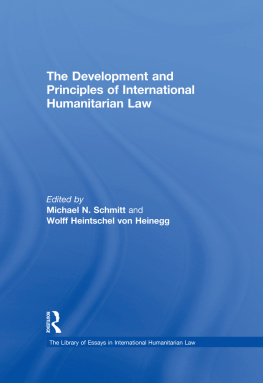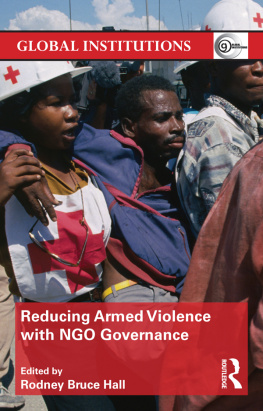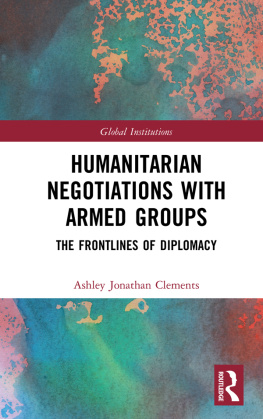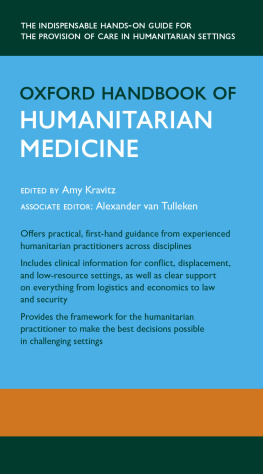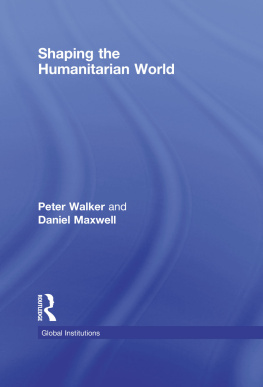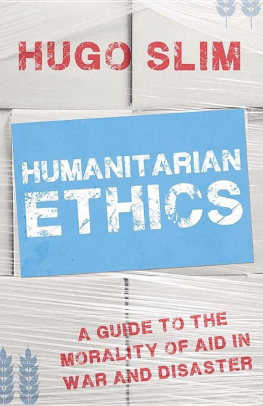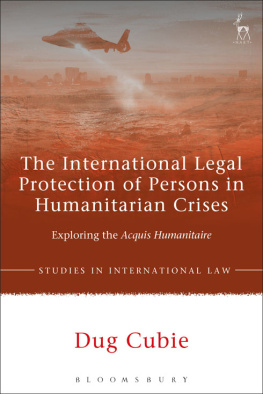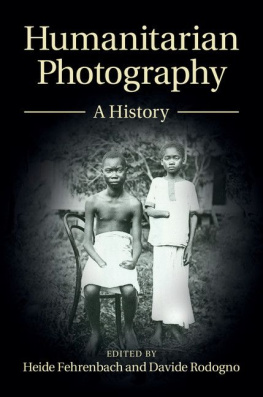HUMANITARIAN NGOS, (IN)SECURITY AND IDENTITY
Global Security in a Changing World
Series Editor: Professor Nana K. Poku,
Health Economics and AIDS Research Division (HEARD), South Africa
Globalization is changing the world dramatically, and a very public debate is taking place about the form, extent and significance of these changes. At the centre of this debate lie conflicting claims about the forces and processes shaping security. As a result, notions of inequality, poverty and the cultural realm of identity politics have all surfaced alongside terrorism, environmental changes and bio-medical weapons as essential features of the contemporary global political landscape. In this sense, the debate on globalization calls for a fundamental shift from a status quo political reality to one that dislodges states as the primary referent, and instead sees states as a means and not the end to various security issues, ranging from individual security to international terrorism. More importantly, centred at the cognitive stage of thought, it is also a move towards conceiving the concept of insecurity in terms of change.
The series attempts to address this imbalance by encouraging a robust and multi-disciplinary assessment of the asymmetrical nature of globalization. Scholarship is sought from areas such as: global governance, poverty and insecurity, development, civil society, religion, terrorism and globalization.
Other titles in this series:
United Nations Peacekeeping Challenge
The Importance of the Integrated Approach
Edited by Anna Powles, Negar Partow and Nick Nelson
ISBN 978-1-4724-3246-9
Towards an African Peace and Security Regime
Continental Embeddedness, Transnational Linkages, Strategic Relevance
Edited by Ulf Engel and Joo Gomes Porto
ISBN 978-0-7546-7604-1
Challenging Post-conflict Environments
Sustainable Agriculture
Edited by Alpaslan zerdem and Rebecca Roberts
ISBN 978-1-4094-3482-5
Post-conflict Disarmament, Demobilization and Reintegration
Bringing State-building Back In
Edited by Antonio Giustozzi
ISBN 978-1-4094-3738-3
Humanitarian NGOs, (In)Security and Identity
Epistemic Communities and Security Governance
ANDREA SCHNEIKER
University of Siegen, Germany
First published 2015 by Ashgate Publishing
Published 2016 by Routledge
2 Park Square, Milton Park, Abingdon, Oxon OX14 4RN
711 Third Avenue, New York, NY 10017, USA
Routledge is an imprint of the Taylor & Francis Group, an informa business
Copyright Andrea Schneiker 2015
Andrea Schneiker has asserted her right under the Copyright, Designs and Patents Act, 1988, to be identified as the author of this work.
All rights reserved. No part of this book may be reprinted or reproduced or utilised in any form or by any electronic, mechanical, or other means, now known or hereafter invented, including photocopying and recording, or in any information storage or retrieval system, without permission in writing from the publishers.
Notice:
Product or corporate names may be trademarks or registered trademarks, and are used only for identification and explanation without intent to infringe.
British Library Cataloguing in Publication Data
A catalogue record for this book is available from the British Library
The Library of Congress has cataloged the printed edition as follows:
Schneiker, Andrea.
Humanitarian NGOs, (in)security and identity : epistemic communities and security governance / by Andrea Schneiker.
pages cm.(Global security in a changing world)
Includes bibliographical references and index.
ISBN 978-1-4724-3807-2 (hardback)ISBN 978-1-3155-8760-8 (ebook)ISBN 978-1-3171-1952-4 (epub) 1. Non-governmental organizations. 2. Humanitarian assistance. 3. Security, International. I. Title.
JZ4841.S36 2015
361.77dc23
2015011090
ISBN 9781472438072 (hbk)
ISBN 9781315587608 (ebk-PDF)
ISBN 9781317119524 (ebk-ePUB)
List of Figures and Table
Figures
Table
Acknowledgements
This book originated from a research grant I received from Leibniz University Hannover in 2009 for a post-doc research project. I owe thanks to many people who have supported me throughout my research for this book and the process of writing it, including Christiane Lemke, Charlotte Dany, Christiane Frhlich, Sylvia Maier, Niina Merilinen, Romina Ranke, Natalia Dalmer and Luise Druke. I also would like to thank the participants of a workshop on Epistemic Communities in Europe at the University of Siegen in 2014 and especially Maia Davis Cross for their very helpful comments and insights. Jutta Joachim deserves special thanks for her invaluable comments and her support at every stage of the project. I also would like to thank all the interviewees for sharing their time and thoughts with me. Without their willingness to participate in the project I would not have been able to carry out this research and write this work.
I am very grateful for the financial support I received from Leibniz University Hannover and I would also like to thank the Center for European and Mediterranean Studies (CEMS) at New York University for hosting me for a few weeks in 2011 as visiting scholar. I owe gratitude to my research assistants Pia Honerath, Imke Rueben, Wiebke Pielhop, Natalia Dalmer, Debra Noe, Henriette Lange, Eva Linnenbaum, Stefanie Schmidt and Melanie Jger for their support with the transcription of the interviews and the preparation of the manuscript. I also would like to thank Annemarie Weitzel for helping me in preparing the manuscript for publication.
I also would like to thank the anonymous reviewer for the very good comments and useful insights and the editorial staff at Ashgate, particularly Kirstin Howgate, Brenda Sharp and Sadie Copley-May.
Last but not least, I want to thank my parents and Jens who have always supported me beyond what I expected and without whom I would not have been able to finish this project.
Responsibility for any errors lies with the author.
Andrea Schneiker
List of Abbreviations
|
|---|
ALNAP | Active Learning Network for Accountability and Performance |
in Humanitarian Action |
ANSO | Afghanistan NGO Safety Offce |
AWSD | Aid Worker Security Database |
CBHA | Consortium of British Humanitarian Agencies |
CIVMIL | civilmilitary relations |
CRS | Catholic Relief Services |
CSD | Centre for Safety and Development |
CSSP | Community of Safety & Security Practice |
DAC | Development Assistance Committee |
DANIDA | Danish International Development Agency |
DFID | Department for International Development |
DRC | Democratic Republic of Congo |

